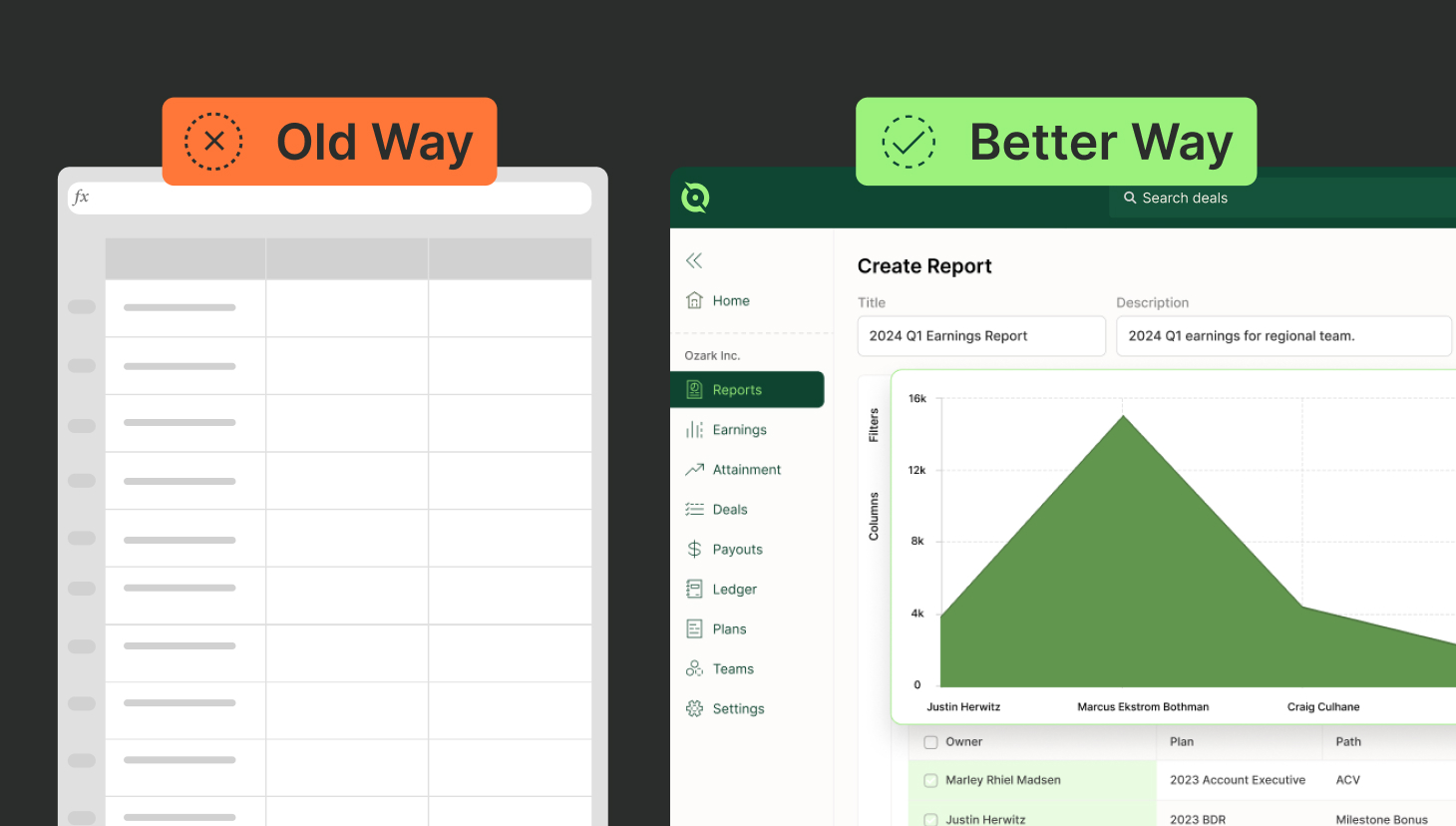In our 2024 Compensation Trends report, “Solving the biggest sales compensation challenges: Insights from 450+ Finance, RevOps, and Sales Leaders,” we asked leaders to think about how often reps quit over commission disputes.
This report discloses compensation management challenges shared by directors, VPs, and C-level executives from Sales, Finance, and RevOps in the United States and the United Kingdom surveyed during the first half of 2023.
This report aimed to understand the root cause of leadership disconnects, understand common compensation challenges, reveal gaps, and offer comp plan preparation guidance.
The survey findings highlighted that 100% of Revenue leaders agree that sales comp plans need improvement and that 78% of revenue leaders admitted that their sales reps find their compensation plans difficult to understand.
Thus far, we have dug deeper into areas of the survey in articles like:
– Leaders share 5 biggest challenges with sales compensation plans
– “Alignment” is most needed area of improvement in sales compensation management
– Why 91% of sales teams missed quota this year
This blog focuses exclusively on the impact of poor compensation management on rep exits and discusses the problem, why it is rampant, and how to avoid it.
What is the long-term impact of poor compensation management?
The answer: reps quit over it.
Leaders shared that 22% of reps have at least one dispute a year, and survey findings showed that 9% of reps eventually quit over commission errors or disputes.
Failure to address this costly issue can greatly impact revenue and business goal attainment.
Why reps quit and how compensation plays a role
Sales rep churn has historically been significantly higher than in other departments, hovering around 35% per year, according to Hubspot. That’s a significant amount, considering that organizations typically experience about 10% turnover yearly. So, why do reps quit, and what role does compensation play in this trend?
Lack of development and advancement opportunities
Sellers are demotivated when they don’t receive skill development or opportunities for advancement. This alone can lead sellers to display symptoms of “quiet quitting,” such as demotivation and minimal performance, according to Gartner. This makes them 35% less likely to attain quota and 51% more likely to be actively job-seeking. The Association of Talent Development (ATD) also found that 41% of people quit their jobs due to a lack of career development and advancement opportunities.
Lack of tools and technology
Tools and technology to boost efficiency and effectiveness used to be nice to-haves and are now expected. The Sales Happiness Index revealed that 33% of those who want to leave their roles cited a lack of access to the best tools and technology to be successful.
Calculate OTE:Quota ratios
Use this free calculator to ensure your reps’ on-target earnings and quotas mirror what they’re bringing in for the business.
Try it NowUnrealistic targets
Pushing reps to achieve seemingly unattainable goals leaves reps feeling burned out. Gartner’s survey showed that 89% of sellers feel burned out, and 54% are actively job-seeking.
So, it’s not surprising that Gartner also found that 67% of reps surveyed felt that leadership is overly optimistic and disconnected from the reality of sales today.
Unmotivated
Gartner found that 59% of sellers don’t believe management can motivate them. This creates what they call “high levels of seller drag, or a demotivation away from work,” a symptom experienced by 83% of sellers and most often associated with lower quota attainment and higher intent to leave.
Benefits, bonuses, and pay
According to the Sales Happiness Index, 43% of salespeople who want to leave their current job cited a lack of benefits, 31% a lack of bonuses, and 51% indicated they would leave for higher pay. During challenging economic times with limited deals, commission-only reps may be inspired to jump ship for employers that offer a base salary, especially since many sales pros got into sales because of the high earnings potential.
Commission mismanagement
Lastly, our research revealed that an average of 22% of sales reps have at least one commission dispute yearly, and 9% of reps quit over commission mismanagement. That’s nearly one-tenth of rep churn.
As you can see, compensation plays a major role in rep turnover in various ways. Understanding these contributors to rep attrition enables you to recognize and address them.
What causes commission disputes and incorrect checks?
Sales commission disputes contribute to rep turnover and arise more frequently than expected. These disputes and incorrect checks have several causes, including:
- Lack of understanding: Our data showed that 60% of reps take 3 to 6 months to fully understand how they earn variable pay from their comp plans. Reps are then unclear about how much to expect in their checks and when. This may cause them to question the earnings in their checks.
- Overly complex comp plans: 17% of leaders in our survey noted that plans too complicated for reps to understand were a compensation obstacle for them. Excessively complicated plans make it difficult for reps to understand how they are paid and what to expect in their commission checks. This may lead them to believe their pay is incorrect when it doesn’t match their expectations. Plus, too complex plans require additional effort to calculate, track, and pay, increasing the odds of errors.
- Manual entry errors: Human errors in Excel spreadsheets are common. All it takes is an additional zero or a misplaced decimal point to throw off calculations. Inaccuracies accumulate as spreadsheets pass between teams. Then, plan changes further increase the number of errors.
- Lack of transparency: An inability for reps to easily track and view their earnings makes it more difficult to catch errors in commission calculations to head off disputes.
Design, track, and manage variable incentives with QuotaPath. Give your RevOps, finance, and sales teams transparency into sales compensation.
Talk to SalesThe cost of poor compensation management
Poor compensation management costs add up. It all starts with the costs of filling empty seats on the sales floor when reps quit.
“The cost of hiring a new salesperson isn’t terribly expensive, but the most expensive seat on the sales floor is an empty seat,” said QuotaPath Chief of Staff Graham Collins.
For instance, if a leader takes an average of 30 days to find and hire a new salesperson, add 90 days of ramp time before they can start selling deals.
“That’s four months of sales lost,” said Graham. “So, if your rep’s quota is 5x that of their on-target earnings, the company is losing 1.66x the salesperson’s OTE, or 3x their salary.”
Therefore, a rep who earns a $50K base salary costs the company $150K.
That’s $150K that could be avoided with better compensation management.
Then, going beyond the cost of replacing reps who quit, there’s lost selling time, sales rep demotivation, and time invested in addressing disputes and errors.
Disputes and incorrect commission checks damage trust and often cause reps to track and calculate their earnings manually. This further detracts from selling time.
How to avoid poor compensation management using QuotaPath
You can overcome compensation management issues and avoid commission disputes with QuotaPath.
- Gives reps visibility into compensation plans, real-time earnings, and commission calculations.
- Enables reps to catch and flag discrepancies before commissions are paid.
- Facilitates communication between reps and commission managers concerning errors and disputes, then tracks their resolution in the app.
- Prioritizes pressing tasks in a complete dashboard to hasten resolution.
- Organizes commission data and insights to look up deal specifics easily.
- Provides your reps with an accessible view of current, forecasted, paid, and upcoming commission information to promote compensation accountability and motivation.
Looking for additional ways to address poor compensation management issues? Download the full report or chat with our sales team on sales compensation management improvements using QuotaPath.



